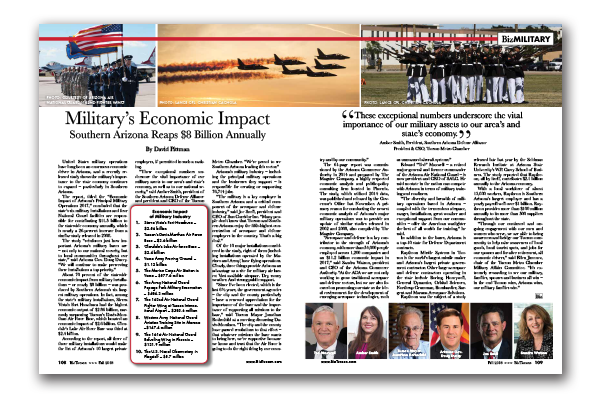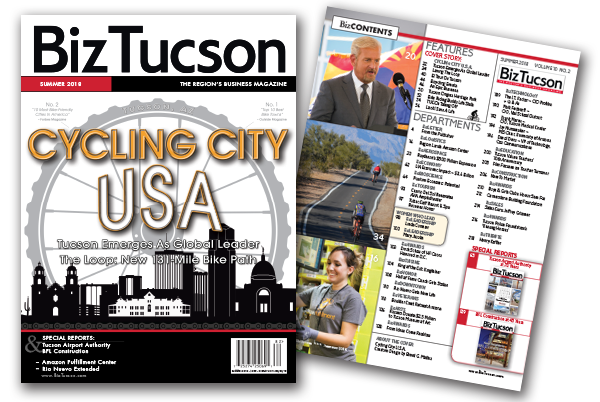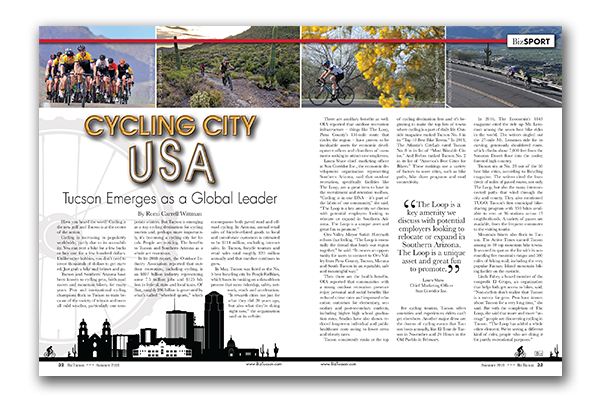
Raytheon’s $500 Million Expansion
By Jay Gonzales –
2,000 New High-Wage Jobs
The ribbon was cut May 10 on one of the region’s biggest economic development victories.
With Gov. Doug Ducey and a bevy of leading government and business officials on hand, Raytheon Missile Systems President Taylor W. Lawrence officially opened the first new building in its expansion that is bringing 2,000 new jobs to its Tucson facility on the grounds of Tucson International Airport.
“Today marks an important milestone for our company, our community, our state and for the defense of our nation and its allies,” Lawrence said in his prepared remarks at the formal ribbon-cutting in front of the new customer access center. “These new facilities in Tucson will house many of the 2,000 new employees we’re hiring over the next few years.”
The expansion was announced in November. By the time of the ribbon-cutting, Lawrence said, more than 1,500 of the new jobs, with average salaries of more than $100,000, had been filled. In addition to the customer access center, an advanced testing facility and a multipurpose building are expected to be completed this year.
“The new buildings are part of an overall expansion to really focus on our research and development,” Lawrence said. “They’re going to house laboratories, a high-performance computing facility, what we call an anechoic chamber – a massive indoor structure that allows us to test missiles and their sensors in an RF (radio frequency) quiet environment. So this is really all about high-performance, next-generation missile research and development.”
As business and government leaders celebrated Raytheon’s investment in the region, they recalled that it was a major economic-development loss – the Tesla battery manufacturing facility in 2014 – that triggered the collaboration that put the incentives in place to get Raytheon to expand here. Lawrence said Raytheon looked at Texas, Alabama, New Mexico, Kentucky and Arkansas before settling on its decision to expand at its existing facility in Tucson.
“It was actually a loss that pulled this community together – and that was the opportunity to try to attract Tesla to this community,” said Larry Lucero, senior director of government and external affairs for Tucson Electric Power and former chair of the Tucson Metro Chamber board of directors.
“We all realized that in order for us to play in the league that we always thought was way over our heads – if we all work together, if we all collaborate and look at all of our strengths – we can pull a great proposal together and attract the kind of employers like we have here already like Raytheon, but also new employers like Caterpillar, like Vector Space and on and on.”
“That was a time when we all came together as a region, including the university, Pima College, Sun Corridor,” Tucson Mayor Jonathan Rothschild said of the Tesla effort. “We sat down as a team and said, ‘Look, let’s put this thing together.’ And we got to be one of the three finalists from not even being on the board. So there’s no question that when we work together, we can do it.”
Lucero added: “The opportunities are there. There was this big ‘aha’ moment as we all sat around the room realizing that we had put together a really, really good effort, a great effort, and in some instances a superior proposal that we had never put together before. It was the light bulb going on.”
Lawrence said one of the key moves for Tucson to get the expansion was the realignment of Hughes Access Road, now known as Aero Park Boulevard, to give Raytheon a critical buffer between its facilities and the airport. Raytheon also agreed to be annexed into the city of Tucson, which allowed city government to then provide additional incentives by setting aside tax revenue for future infrastructure improvements.
“Everybody sort of said, ‘What do we need to do to make this happen?’” Lawrence said. “They came and got things done.”
Lawrence credited Ducey and U.S. Sen. John McCain, among others, with providing the nudge to assemble the critical pieces of Tucson’s proposal after a time in which the region’s economic development stakeholders gained a reputation for operating independently and without a common vision.
“It has gotten so much better in the last four or five years, especially since Gov. Ducey came in as governor,” Lawrence said. “I also give a lot of credit to John McCain. He got really involved in this. We were ready to look at other opportunities and then we got the road moved. There was a lot of bureaucracy that Senator McCain had to help us manage our way through.
“The road was a big deal for us. But other infrastructure work on the freeways and in education is hugely important. We hire more engineers out of the UA than any other college. We need healthy, vibrant university systems in the state because that helps us to sell to our employees that there’s a school system that will support their children. All those play into having a vibrant business environment that we can take advantage of.”
Construction at the site will continue through 2020. The general contractor is Brassfield & Gorrie of Birmingham, Alabama, but Lawrence noted that 95 percent of the subcontractors have been from Arizona. The project has employed more than 600 construction workers.
In a news release, Raytheon said it is “designing, engineering, testing and manufacturing some of the most advanced aerospace and defense technologies of today and the future – including missile defense systems, hypersonic missiles and space vehicles.”
The new construction will add 559,000 square feet of commercial space with a total investment by Raytheon of more than $500 million. When the hiring is complete, Raytheon will have approximately 12,000 employees in Tucson. It is the company’s largest expansion in Tucson in 30 years.
“The impact of adding nearly 2,000 jobs and significant investment by our region’s largest private employer cannot be overstated,” said Joe Snell, president & CEO of Sun Corridor Inc. “Raytheon’s decision comes on the heels of other relocations and expansions in the last few years by Caterpillar, HomeGoods and Comcast among others. Southern Arizona is a region on the move.”
In addition to the jobs and impact it provides, Lawrence said, Raytheon’s presence provides Tucson with an anchor company that will attract others, can raise the quality of education in the area and can provide opportunities for a diverse and well-paid workforce.
“We’re building an increasingly diverse, multi-generational workforce that enjoys a broadening range of career opportunities,” Lawrence said. “Working together, we’re demonstrating the potential of STEM education (science, technology, engineering and math) to create career opportunities and public and private partnerships to advance our local and state economies.
“Together we are demonstrating Southern Arizona’s trends in innovation, technology and quality as a community to attract and retain top talent. As our business grows, we will hire people at all skill levels with an emphasis on engineering and other higher-wage and technical positions. These jobs will fuel Raytheon’s growth and bring even more top talent to this region.”
Ducey said Raytheon’s expansion, while located in Tucson, benefits the entire state, considering the overall economic impact indicated in the ASU study.
“This is another major win for Southern Arizona and really for the entire state as an international brand and company expands inside the state of Arizona,” Ducey said. “Raytheon’s importance to Arizona’s economy and our economic health and future cannot be overestimated.”





